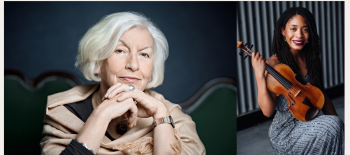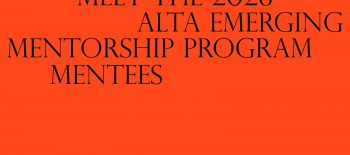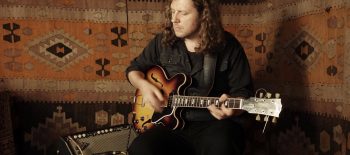2000-2021
Polish Cultural Institute New York
60 E 42nd St Ste 3000
New York, NY 10165
Looking back at the last 20+1 years of our work, we celebrate our 21st anniversary with you by sharing selected projects done in the past 21 years. Explore more current and recent Music Projects.
Explore further highlights of the 20+1 years of our work:
→ Music
→ Humanities
→ Visual Arts & Design
→ Film & Performing Arts
→ Polish-Jewish Programming
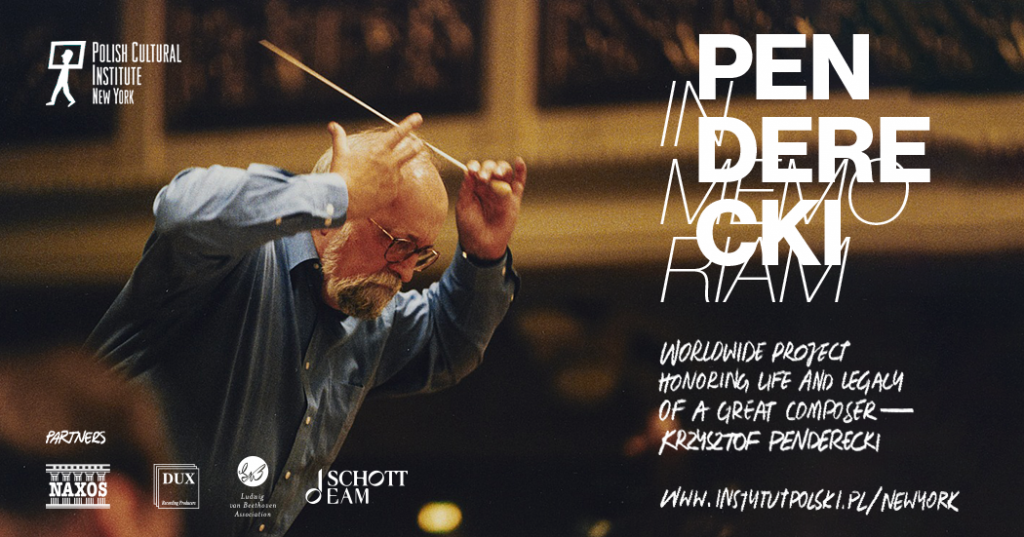
Throughout the spring of 2021, the Polish Cultural Institute New York curated Krzysztof Penderecki in Memoriam, honoring the life and legacy of Poland’s greatest modern composer. Marking the one-year anniversary of Penderecki’s death, the Polish Cultural Institute New York—in partnership with the Ludwig van Beethoven Association, Crossover Media, DUX Records, Lincoln Center, Naxos of America, and Schott Music publishers—celebrated Penderecki’s life and legacy across an array of worldwide media outlets. To commemorate such phenomenal persona, we produced Penderecki in Memoriam Podcast featuring interviews with Penderecki’s friends and collaborators: Barry Douglas, Sergey Smbatyan, Rafael Payer, Laura Kaminsky, Antoni Wit, Kent Nagano, JoAnn Falletta, Leonard Slatkin, Łukasz Borowicz, Elliot Goldenthal, Osmo Vanska, Małgorzata Polańska, Anne-Sophe Mutter, Jonny Greenwood, and Julian Rachlin.
“The passing of Professor Penderecki was a deeply moving loss and a shock to all who knew him personally as well as to those who admired his work. The loss was especially poignant due to the world’s Covid-19 isolation – and I was overwhelmed by the response and eagerness of all the artists who wanted to be involved and honor his memory”—Anna Perzanowska, Music Curator at the Polish Cultural Institute New York
Selected Press:
Vogue Polska: Koncerty i podcasty „Krzysztof Penderecki in Memoriam”
Gazeta Wyborcza: Słynny festiwal muzyczny online i bezpłatnie. Polecamy najciekawsze koncerty
Classical Source: Polish Cultural Institute New York presents Krzysztof Penderecki in Memoriam
Classical Music Daily: In Memoriam Krzysztof Penderecki
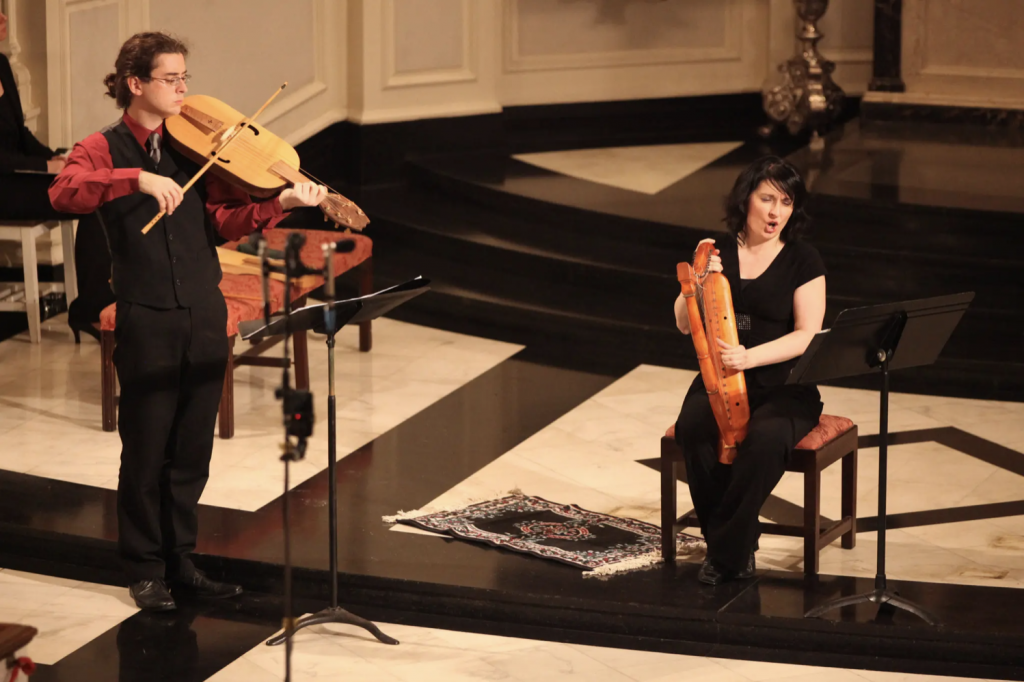
Early Music Celebration
Early Music Foundation and the Polish Cultural Institute New York presented the New York Early Music Celebration “Pro Musica Polonica,“ taking place city-wide in 2013. An EMF Service-to-the-Field project, the Celebration showcased New York’s historically informed performance artists, ensembles and presenters. Open to the entire New York historical performance community, Celebration 2013 featured Polish early music artists as guest performers. The festival spanned more than twenty events, presented by the Morgan Library & Museum, Music Before 1800, Carnegie Hall, Church of the Epiphany, Miller Theatre at Columbia University, and others. Image: New York Early Music Celebration Baptiste Romain, left, and Agnieszka Budzinska-Bennett performing on Sunday at Corpus Christi Church in Morningside Heights. Credit: Michelle V. Agins/The New York Times
The New York Times: A Polish History Lesson Emerges Through Song
The New Yorker: “Pro Musica Polonica”: Ensemble Peregrina (Music Before 1800)
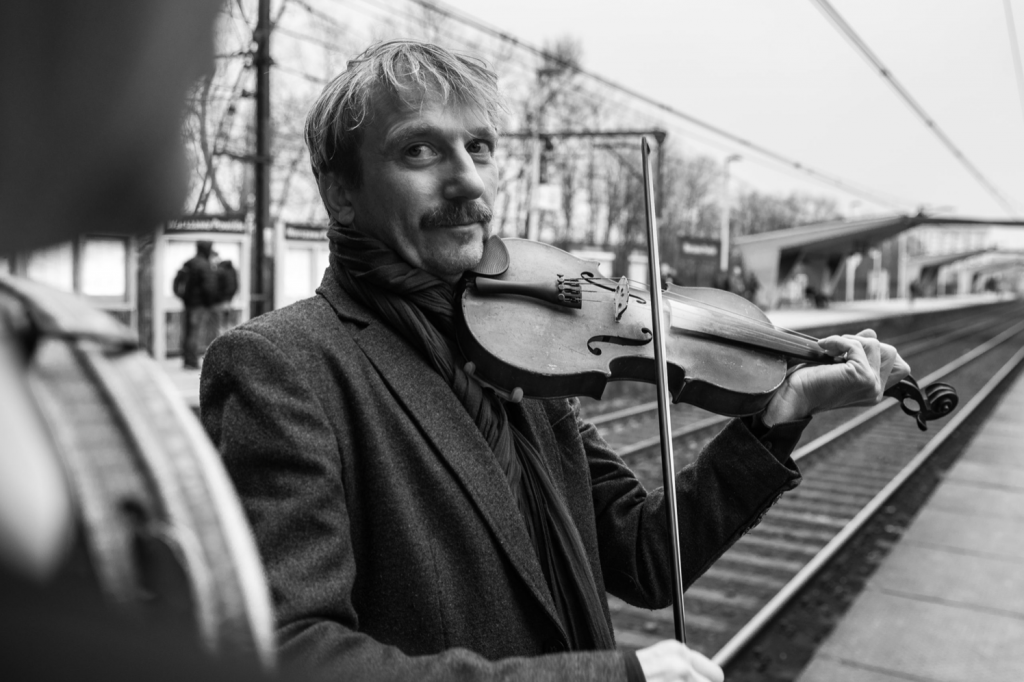
Janusz Prusinowski Trio
In 2013 we organized a US tour of Janusz Prusinowski Trio—a group of musicians who follow in the traditions of village masters they have personally learned from, but they are also an avant-garde band with their own characteristic sound and language of improvisation. They combine music with dance, and the archaic with the modern. The Trio’s unique style is distilled from their informed reinterpretations of central Poland’s village music. Listening to the Trio you can hear how traditional music of Polish villages echoes or is echoed by a variety of genres: the music of Chopin in its melodic pattern and the use of rubato, a shared love of improvisation with blues and jazz, a tonal sophistication reminiscent of 20th century classical and free improvisation, and the energy and propulsion of rock music.
What struck me right away about this music was its amazing ability to mix the feel and power of village dance music with the personal contemporary sensibilities of the players. (…) The addition of wind and brass to the Trio’s sound really pushes their music into another realm.—Michal Shapiro, Huffington Post on WOMEX performance
Selected Press:
The New York Times: Classical Music and Opera Listings for Oct. 4-10
The New Yorker: “Pro Musica Polonica”: “Wild Music From the Heart of Poland”
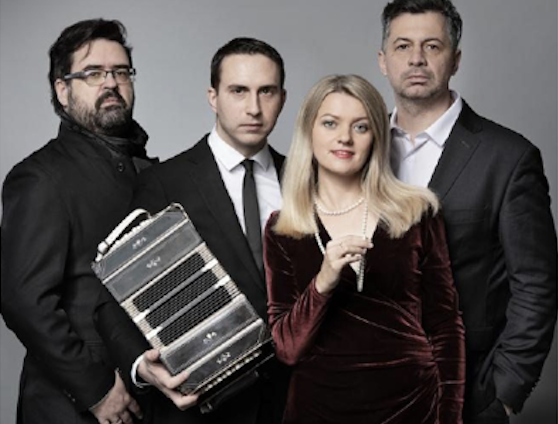
Yiddish Tango
Yiddish Tango from Warsaw: Olga Avigail Mieleszczuk and Tango Attack—The multilingual repertoire of this project includes songs in Polish, Yiddish, and Hebrew, reflecting the distinct international expressions of interwar Warsaw. As the tango craze swept through Europe, Warsaw became the eastern European capital of tango and bore witness to the birth of the dance form’s most eclectic permutation, combining Slavic and Jewish elements with Argentinian musical influences. The tour was presented by Polish Cultural Institute New York in partnership with JCC Manhattan, JCC Staten Island and Kennedy Center in Washington, DC . The concert at Kennedy Center was presented in partnership with the Embassy of the Republic of Poland in DC.
“When I started to sing in Yiddish, I had no idea about Jewish culture at all,” [Olga Avigail Mieleszczuk] said, recalling the emotional visit. “This world suddenly opened up to me in Auschwitz. I was there for five days doing meditation and tikkun olam [repairing the world]. A Hasidic rabbi sang in Hebrew and Yiddish, and I felt deeply connected with the place.”—Jewish Telegraphic Agency
Selected Press:
Jewish Telegraphic Agency: Meet the Catholic-born Polish Orthodox Jew who’s reviving Yiddish tango
The New York Jewish Week: NYC Jewish-y Events, September 20-29
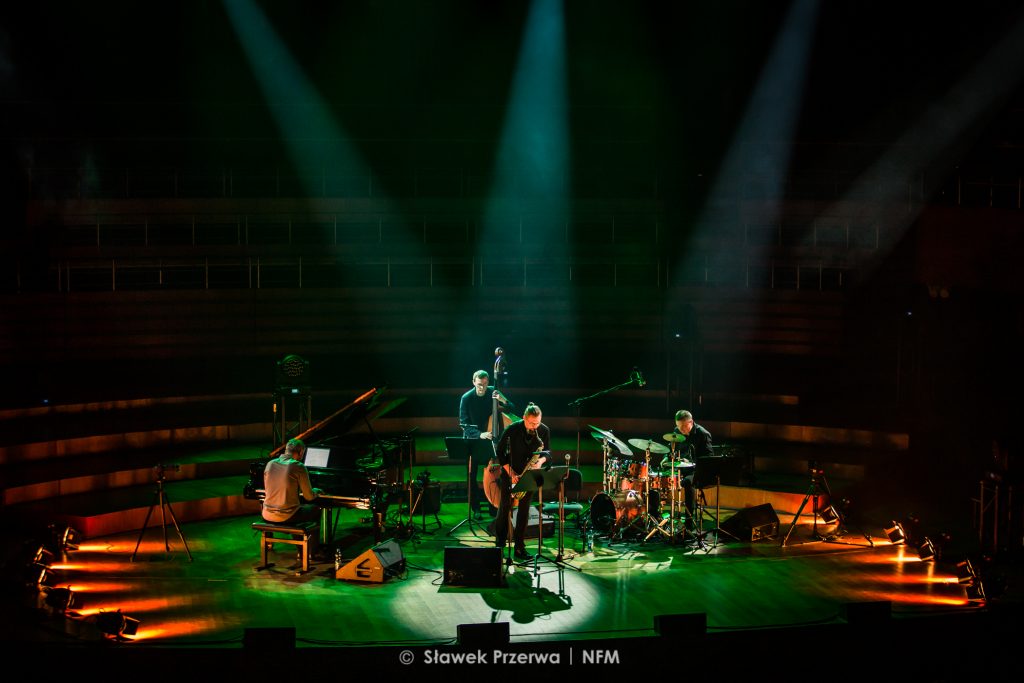
Jazztopad Festival
Jazztopad Festival‘s presence in the US began in 2015 and the festival is organized yearly. In 2021 the project was live-streamed from Poland. Jazztopad Festival, in partnership with Polish Cultural Institute New York presented The Great Improvisation series online live streamed from the National Forum of Music(NFM) in Wrocław, Poland. The series presents various faces of jazz – from bold avant-garde and daring improvisation through to the mainstream. The ideal acoustics of the NFM halls provide a perfect environment for both young Polish bands as well as established artists. The series has presented such musicians as Wynton Marsalis, Bobo Stenson, Gregory Porter, Tomasz Stańko, Kuba Więcek, Brad Mehldau, and Dianne Reeves. Photo: Radek Nowicki Quartet at Jazztopad Festival.
“Jazztopad is a renowned jazz festival in Poland, and since 2015, it has brought a satellite delegation to New York for a run in the United States.”—The New York Times
Selected Press:
The New York Times: 14 Pop, Rock and Jazz Concerts to Check Out in N.Y.C. This Weekend
The New York Times: Jason Moran, From the Venice Biennale to the Village Vanguard
JAZZIZ: Jazztopad Fest Offers Vivid Glimpse Into Polish Jazz Scene
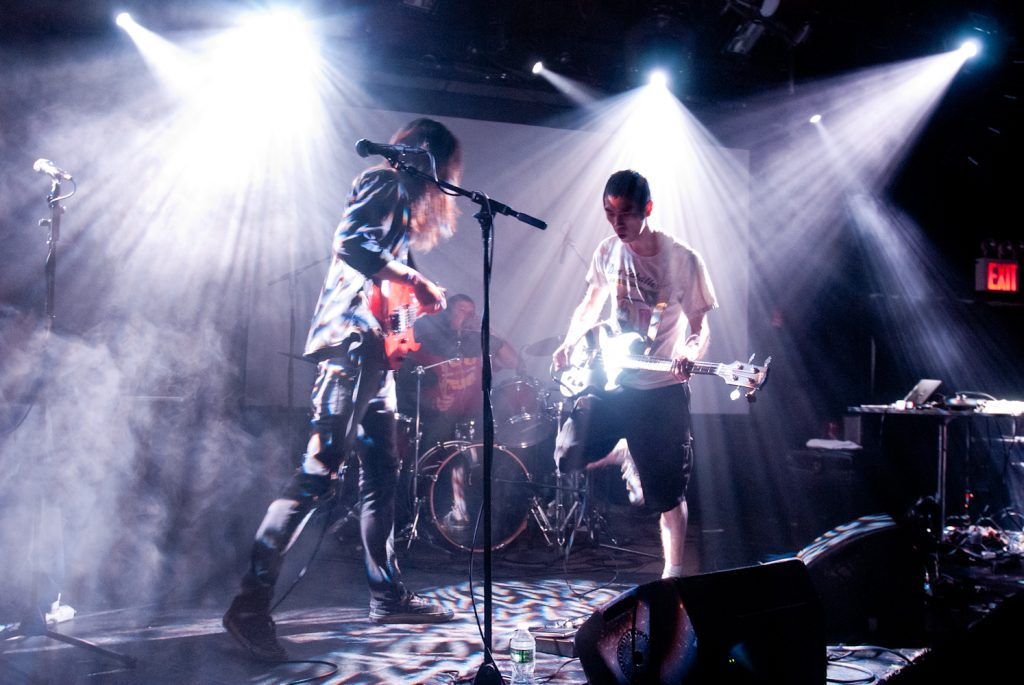
Unsound Festival
Unsound Festival‘ presence in North America began in 2010 and the festival is organized yearly. Unsound focuses on a broad swath of contemporary music—emerging, experimental, and leftfield—whose sweep doesn’t follow typical genre constraints. Influential around the world, it has developed a reputation for identifying innovative scenes and radical sounds. It’s a platform for an exchange of artistic ideas for musicians, visual artists, curators, journalists, record label owners and booking agents from every continent. Photo: Next Life at Unsound Festival, photo by Natasha Phillips.
“There was a pulse to the music, at first like the respiration of a sleeping leviathan and eventually with an established beat, created at first by a low repeating crash, like a tall tree falling. The music gradually accelerated to what would have been, in most concerts, the slowest dirge; a steady drumbeat surfaced, and eventually a syncopated one, only to disappear within a looming, buzzing drone. The last stretch of the music was marginally more conventional, with rushes of cymbals and hovering, Penderecki-like classical choirs. Another beat emerged, steady and industrial, with jackhammer sounds. But it, too, would be swallowed in rumble and drone, manmade music reverting to primordial sound.”—By Jon Pareles for The New York Times
Selected Press:
The New York Times: Good and Evil, Ritual and Nightmare, in Sight and Sound
The New York Times: The Beauty of Pulses, the Glory of Drones
The New York Times: Classical, as It Meets Club Scene
The New York Times: Music With Texture, Shaking the Auditorium
The New York Times: Imaginary Soundtracks for Two Silent Warhol Films
The Guardian: Unsound festival 2015 – surprises from a salt mine with the Midas touch
Artforum: Sasha Frere-Jones on Unsound New York 2019
Electronic Beats: A History Of Unsound Festival According To Co-Founder And Artistic Director Mat Schulz
Pitchfork: Buried Alive: Unlocking the Mysteries of Poland’s Unsound Festival

The Focus! Festival has been presented for over 30 years at Julliard. In our 2011 collaboration with Julliard, at the Juilliard’s 27th annual mid-winter festival of ‘new’ music, we presented Polish Modern: New Directions in Polish Music Since 1945 with six free concerts. The composers presented on the Focus! festival represented several generations and a broad range of styles from Krysztof Penderecki, Boguslaw Schaeffer, Kazimierz Serocki and others born before the mid-1930s; to composers including Krysztof Knittel, Aleksander Lason, Marian Sawa, and Stanislaw Moryto from the 1940s; to Pawel Szymanski, Tadeusz Wielecki, and those born ten years later; and Pawel Mykietyn, Aleksandra Gryka, Wojciech Zimowit Zych, and the 1970s generation.
“The earliest work here, Grazyna Bacewicz’s “Contradizione” (1966), set the stage with a colorfully orchestrated atmospheric haze that sounded almost electronic at first and quickly morphed into a series of high-contrast figures: smoothly flowing passages gave way to sharply etched ones; assertive writing melted into nebulousness.”—Allan Kozinn at The New York Times
Selected Press:
The New York Times: Embracing the Modern With Tone Clusters, Not Dissonance
WQXR: Polish Music Since 1945
On Polish Music: Polish Music ‘Muzyka Nowa’, WQXR
***
THE POLISH CULTURAL INSTITUTE NEW YORK was founded in 2000. It is a diplomatic mission of the Ministry of Foreign Affairs of the Republic of Poland, operating in the area of public diplomacy. The PCI is one of 24 such institutes around the world. It is also an active member of the network of the European Union National Institutes for Culture (EUNIC) in its New York cluster.
Explore the highlights of the 20+1 years of our work:
→ Music
→ Humanities
→ Visual Arts & Design
→ Film & Performing Arts
→ Polish-Jewish Programming
The Institute’s mission is to share Polish heritage and contemporary art with American audiences, and to promote Poland’s contributions to the success of world culture. The Institute does so through initiating, supporting and promoting collaboration between Poland and the United States in the areas of visual art, design, film, theater, dance, literature, music, and in many other aspects of intellectual and social life. The Institute’s main task to ensure Polish participation in the programming of America’s most important cultural institutions as well as in large international initiatives.
The Polish Cultural Institute New York works with renowned cultural and academic centers and opinion leaders operating on the American market. Its main partners include such prestigious organizations as Lincoln Center for the Performing Arts, the Brooklyn Academy of Music, the Museum of Modern Art, PEN American Center, the Poetry Society of America, the National Gallery of Art, Yale University, Columbia University, Princeton University, the Harvard Film Archive, the CUNY Graduate Center, the Julliard School of Music, the New Museum, the Jewish Museum, La MaMa E.T.C. and many others. For more than fifteen years, it has presented Americans the achievements of outstanding Polish artists, including the filmmakers Andrzej Wajda and Jerzy Skolimowski; the writers Czeslaw Milosz, Adam Zagajewski and Wislawa Szymborska; the composers Krzysztof Penderecki, Witold Lutoslawski and Mikolaj Gorecki; theater artists Krystian Lupa, Jerzy Grotowski and Tadeusz Kantor; the visual artists Krzysztof Wodiczko, Katarzyna Kozyra, Alina Szapocznikow and many other important figures in the arts. The Institute initiates and actively participates in debates around the humanities in the broad sense, including those concerning history and the today’s most important social and political occurrences.

